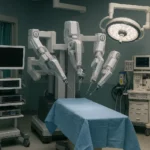Multiple Sclerosis Treatment – Causes, Symptoms & Options
In reality, experiencing one of those signs that come with multiple sclerosis is not merely seeing new signs of fatigue or numbness. Living with multiple sclerosis involves battling every single day against an illness with unpredictable and invisible symptoms. The encouraging news is that the medical field is constantly progressing and bringing better and more targeted Multiple Sclerosis Treatment options for patients now than ever before — from stem cell therapy to immunotherapy and biologics. Emerging new hope will be there for people living with MS.
This beautiful text allows entering into the deeper dimensions of MS: specifically, how it truly feels, what causes it, how it is diagnosed, and most importantly, what treatments are changing lives.
Understanding Multiple Sclerosis Treatment
Chronic Autoimmune Disorder:
Multiple Sclerosis (MS) is a long-term autoimmune condition where the immune system mistakenly attacks the myelin sheath protecting nerve fibers in the brain and spinal cord.
Goal of Treatment:
MS treatment focuses on slowing disease progression, managing relapses, and improving daily function and quality of life.
Types of Treatments Available:
MS treatment is often a combination of different approaches, including medications, lifestyle changes, physical therapy, and in some cases, advanced medical procedures.
Disease-Modifying Therapies (DMTs):
These are long-term medications such as interferons or glatiramer acetate that help reduce the frequency and severity of relapses and delay disability progression.
Corticosteroids for Flare-ups:
High-dose steroids are commonly used to manage sudden relapses by reducing nerve inflammation and speeding up recovery.
Symptom Management:
Medications are used to treat specific MS symptoms like fatigue, muscle spasms, pain, depression, and bladder problems.
Advanced Therapies:
Innovative treatments like stem cell therapy, immunotherapy, and biologics are gaining popularity for their potential to reset the immune system and promote repair.
Rehabilitation Support:
Physical therapy, occupational therapy, and cognitive rehabilitation help patients maintain mobility, independence, and mental clarity.
Personalized Care Approach:
Treatment plans are tailored based on the type of MS, disease stage, age, and patient-specific needs, ensuring optimal outcomes.
Hope for the Future:
Ongoing research and clinical trials in MS treatment are continually improving patient prospects and offering new hope for better outcomes.
Multiple Sclerosis Symptoms
Symptoms vary widely, depending on the nerves affected. Some of the most common multiple sclerosis symptoms include:
- Vision problems (blurred or double vision)
- Tingling or numbness in limbs
- Muscle weakness
- Trouble with coordination and balance
- Fatigue that doesn’t go away
- Memory problems or brain fog
For many people, symptoms come and go (called relapses or flare-ups), while others experience steady progression.
Types of Multiple Sclerosis
Understanding the types of multiple sclerosis is crucial when exploring treatment:
- Relapsing-Remitting MS (RRMS) – The most common form, marked by episodes of new or worsening symptoms followed by periods of recovery.
- Secondary Progressive MS (SPMS) – Follows RRMS in some cases, with a steady worsening of symptoms.
- Primary Progressive MS (PPMS) – Gradual worsening from the start without clear relapses.
- Progressive Relapsing MEach type may respond differently to treatment, which is why personalised care is so important.
Multiple Sclerosis Causes
- Exact Cause Still Unknown
Researchers have not yet identified one specific cause of Multiple Sclerosis (MS), but it’s believed to be triggered by a mix of factors.
2. Immune System Malfunction
MS is considered an autoimmune disease, where the immune system mistakenly attacks the myelin sheath that protects nerve fibers.
3. Viral Infections
Certain viruses, especially the Epstein-Barr virus (EBV), have been linked to an increased risk of developing MS.
4. Low Vitamin D Levels
People with low exposure to sunlight or low vitamin D levels may have a higher chance of developing MS, suggesting a role in immune regulation.
5. Smoking
Cigarette smoking is a known environmental risk factor that increases the likelihood of developing MS and can worsen the disease course.
6. Genetic Predisposition
Although MS is not directly inherited, having a close relative with MS—such as a parent or sibling—can slightly increase a person’s risk.
7. Environmental Factors
Growing up in colder climates or regions farther from the equator has been linked to a higher incidence of MS, possibly due to lower sun exposure and vitamin D levels.
How Is Multiple Sclerosis Diagnosed?
Multiple sclerosis diagnosis isn’t always straightforward. There is no single test to confirm it, so doctors rely on a combination of:
- MRI scans to detect brain and spinal cord lesions
- Lumbar puncture to check for abnormalities in cerebrospinal fluid
- Evoked potential tests to measure nerve signal responses
- Blood tests (mainly to rule out other conditions)
A neurologist typically makes the diagnosis based on clinical symptoms and, in addition, these test results.
Multiple Sclerosis Treatment Options
- No Cure, But Effective Management Exists
Multiple Sclerosis (MS) cannot be cured yet, but modern treatments can significantly manage symptoms, reduce relapses, and slow the disease’s progression. - Personalized Treatment Plans
Every MS case is different. Doctors create customized treatment strategies based on the MS type, severity, age, and lifestyle of the patient. - Disease-Modifying Therapies (DMTs)
These medications, such as interferons and monoclonal antibodies (like ocrelizumab), help reduce inflammation and prevent future nerve damage. - Corticosteroids for Relapse Control
During flare-ups, high-dose steroids like methylprednisolone are used to quickly manage inflammation and aid faster recovery. - Symptom Management Medications
Drugs may be prescribed to relieve fatigue, muscle stiffness, bladder issues, nerve pain, or depression—improving daily comfort. - Stem Cell Therapy (HSCT)
A promising option for some patients, HSCT aims to reset the immune system and halt disease activity, especially in aggressive MS cases. - Advanced Immunotherapy & Biologics
These targeted treatments help regulate the immune system and are especially beneficial when first-line therapies don’t work. - Supportive & Rehabilitation Therapies
Physical therapy, occupational support, and mental health care are vital for maintaining function, independence, and overall well-being.
Stem Cell Therapy: A Promising New Hope
Stem cell therapy is one of the most exciting developments in MS treatment. Specifically, it involves using the body’s own stem cells to “reset” the immune system. In particular, hematopoietic stem cell transplantation (HSCT) has shown great promise.
How it Works:
- Damaged immune cells are destroyed with chemotherapy.
- Then, healthy stem cells are reintroduced to build a new immune system that no longer attacks the nerves.
Benefits:
- Fewer relapses
- Slowed or halted disease progression
- Improved physical function in some patients
Stem Cell Therapy in India:
Stem cell therapy in India is thriving now with advanced medical technologies and affordable quality. Some Indian hospitals have begun conducting HSCT for MS following completely stringent guidelines, making it feasible for even international patients.
Immunotherapy for MS: Reprogramming the Immune System
What Is Immunotherapy in MS?
Immunotherapy refers to a medical approach that alters or suppresses the abnormal immune response responsible for attacking the myelin sheath in MS patients.
Beyond Cancer Treatment:
While immunotherapy gained recognition in oncology, it is now revolutionizing treatment options in autoimmune disorders like Multiple Sclerosis.
How It Works in MS:
The goal is to prevent immune cells (like T-cells and B-cells) from mistakenly attacking healthy nerve tissue in the central nervous system.
Common Immunotherapy Drugs in MS:
- Monoclonal antibodies (e.g., Ocrelizumab, Alemtuzumab)
- Selective immune modulators (e.g., Natalizumab)
These target specific immune cells or pathways responsible for MS progression.
Benefits of Immunotherapy in MS:
- Reduces frequency of relapses
- Slows down disease progression
- Offers targeted treatment with fewer side effects compared to older drugs
Why It’s a Breakthrough:
Immunotherapy offers a personalized and precision-based approach, reprogramming the immune system rather than broadly suppressing it.
Ongoing Research:
Scientists are exploring newer immunotherapies that may lead to reversal of damage and long-term remission in MS patients.
Ideal for Certain MS Types:
Especially beneficial for relapsing-remitting MS (RRMS) and some forms of progressive MS, when other treatments are ineffective.
Multiple Sclerosis Medications: A Snapshot
Aside from biologics and immunotherapy, multiple sclerosis medications include:
- Disease-modifying therapies (DMTs) – Interferons, glatiramer acetate
- Steroids – For managing flare-ups
- Muscle relaxants, antidepressants, and fatigue-reducing meds – To manage daily symptoms
Each medication comes with its own pros and cons. What works for one patient may not work for another, so it is always a personalised journey.
Personalised Care: No One-Size-Fits-All
Managing multiple sclerosis is not just one option; rather, it is necessary to develop an appropriate personalized care plan that considers the client’s individual needs—age, type of MS, lifestyle, and treatment-relevant factors. For instance, some cases might benefit from traditional medications with combination multiple sclerosis stem cell treatment or biologics. Additionally, regular follow-up visits to a neurologist, MRI tracking, and lifestyle support (e.g., physical therapy, stress management) also make a difference.
Looking Ahead: The Future of MS Treatment
The immediate future does appear bright! Gene therapies and remyelinating drugs are just part of the scientific exploration for finding ways to not only ameliorate but perhaps even reverse damage caused by MS. Clinical trials are underway, and results have been encouraging.
Stem cell therapy might offer a pathway toward long-term remission for many. Coupled with advanced immunotherapy and biologics, we are entering a new chapter in precision medicine.
Why Should You Choose Regimen Healthcare for Multiple Sclerosis Treatment?
If you’re seeking expert-guided MS treatment abroad, here’s why Regimen Healthcare is the right partner:
- Personalized care coordination from diagnosis to discharge, ensuring a seamless experience throughout.
- Tie-ups with India’s best neurologists and hospitals, offering top-quality medical care.
- Assistance with visas, travel, accommodation & interpreter support, making the process hassle-free.
- Access to affordable stem cell therapy in India, providing cutting-edge treatment options.
- 24×7 support throughout the treatment journey, ensuring help is always available when needed.
- Transparent pricing and expert second opinions before travel, offering peace of mind and clarity.
Why Should You Choose India for Multiple Sclerosis Treatment?
India is becoming a top destination for global MS patients due to the following reasons:
- World-class hospitals with JCI/NABH accreditation, ensuring the highest standards of care.
- Affordable costs (60-80% less than US/UK), making treatment accessible to more patients.
- Internationally trained neurologists and specialists, offering expertise in multiple sclerosis management.
- Availability of multiple sclerosis stem cell treatment, biologics & immunotherapy, providing advanced treatment options.
- No long waiting periods, ensuring quicker access to care.
- Comfortable medical tourism services tailored for global patients, making the entire experience smooth and stress-free.
Final Thoughts on Multiple Sclerosis Treatment
Because of the nature of multiple sclerosis, a cure is still somewhat beyond reach, but treatments are improving with great speed. Patients have more options, and more hope than they have ever held, thanks to advanced multiple sclerosis medications, stem cell therapy in India, targeted abilities from biologics and immunotherapy.
If either you or someone close to you is struggling with MS, stay hopeful. Talk to a specialist about the newest options, and remember: progress is real, and your journey is not one you walk alone.
📞 Need Expert Help Now?
👉 Talk to our specialist care team today for a consultation
📩 WhatsApp or Call: +91-9310356465
🌐 Visit: www.regimenhealthcare.com
📍 Begin your treatment journey with confidence – Regimen is with you every step of the way.
FAQs
1. Is multiple sclerosis curable?
Currently, there’s no cure for MS, but treatments can significantly slow progression and improve quality of life.
2. What is the most effective Multiple Sclerosis Treatment?
Effectiveness varies by patient, but many benefit from a mix of stem cell therapy, immunotherapy, and biologics.
3. Is stem cell therapy approved for Multiple Sclerosis Treatment?
HSCT is used in clinical settings for certain patients, and furthermore, research supports its effectiveness in relapsing MS.
4. Is stem cell therapy in India safe?
Yes, when done at accredited hospitals with experienced specialists, India offers safe and effective stem cell therapy.
5. How does immunotherapy help with Multiple Sclerosis Treatment?
It helps reduce the immune system’s attack on nerves; as a result, this leads to fewer relapses and slower disease progression.
6. Are biologics better than traditional MS drugs?
Biologics offer targeted results and are often used when first-line treatments don’t work or in severe MS types.
7. What are the side effects of MS medications?
Fatigue, flu-like symptoms, lowered immunity, and injection-site reactions are common. Therefore, regular monitoring is essential.
8. Can MS patients live a normal life?
Many do—indeed, with the right treatment plan, support, and lifestyle adjustments, patients can lead active, fulfilling lives.
9. Can Regimen Healthcare help with the entire process of Multiple Sclerosis Treatment?
Absolutely! In fact, from doctor opinions and visa support to hospital bookings and post-treatment care—we manage it all.






